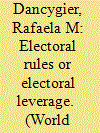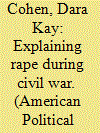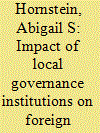| Srl | Item |
| 1 |
ID:
129989


|
|
|
|
|
| Publication |
2014.
|
| Summary/Abstract |
Immigration has fundamentally altered the ethnic and religious makeup of most advanced democracies, but substantial variation is observed in the political representation of immigrant-origin minority groups across countries and cities. Though existing research has highlighted the role of electoral institutions in explaining minority representation, it is often difficult to isolate their effects across contexts. Focusing on Muslims in England and employing a new data set containing over 42,000 candidate-level observations, this article explains Muslim candidate election and selection. To do this, the author makes use of a rule change whereby a subset of localities switched from the use of multimember elections to the use of single-member elections. She finds that these electoral rules have no significant effect on the share of Muslims that gets elected but that they do influence the selection process: in a given election, Muslims are half as likely to be selected when only one seat is up for election as compared with when three seats are in play. Yet parties balance the slate across consecutive single-member elections, leading to similar results across systems. Further, the more undesirable the seat, the more likely it is to have a Muslim on the ticket, but this effect holds only in single-member elections, and it reverses as Muslims gain electoral leverage. Overall electoral leverage proves crucial: the effect of institutions and the potential for institution-based discrimination are conditional on the size and concentration of the local Muslim population and the votes it can deliver at both the election and the selection stages.
|
|
|
|
|
|
|
|
|
|
|
|
|
|
|
|
| 2 |
ID:
127791


|
|
|
|
|
| Publication |
2014.
|
| Summary/Abstract |
Why do some armed groups commit massive wartime rape, whereas others never do? Using an original dataset, I describe the substantial variation in rape by armed actors during recent civil wars and test a series of competing causal explanations. I find evidence that the recruitment mechanism is associated with the occurrence of wartime rape. Specifically, the findings support an argument about wartime rape as a method of socialization, in which armed groups that recruit by force-through abduction or pressganging-use rape to create unit cohesion. State weakness and insurgent contraband funding are also associated with increased wartime rape by rebel groups. I examine observable implications of the argument in a brief case study of the Sierra Leone civil war. The results challenge common explanations for wartime rape, with important implications for scholars and policy makers.
|
|
|
|
|
|
|
|
|
|
|
|
|
|
|
|
| 3 |
ID:
133185


|
|
|
|
|
| Publication |
2014.
|
| Summary/Abstract |
This paper exploits the substantial variation in market institutions across provinces in China to examine the impact of institutional quality on foreign listing. Firms that are listed on the U.S. and U.K. exchanges are more likely to come from better regulated provinces and tend to be at the top of a corporate pyramid. However, though the impact on firm performance of market institutions and pyramidal affiliations persists briefly post-listing with firms recording lower EPS and higher raw returns in the first year, it does not help predict whether firms remain listed abroad in 2012. Thus, we conclude that headquarters' market institutions shape a firm through time of listing and have diminished influence over time.
|
|
|
|
|
|
|
|
|
|
|
|
|
|
|
|